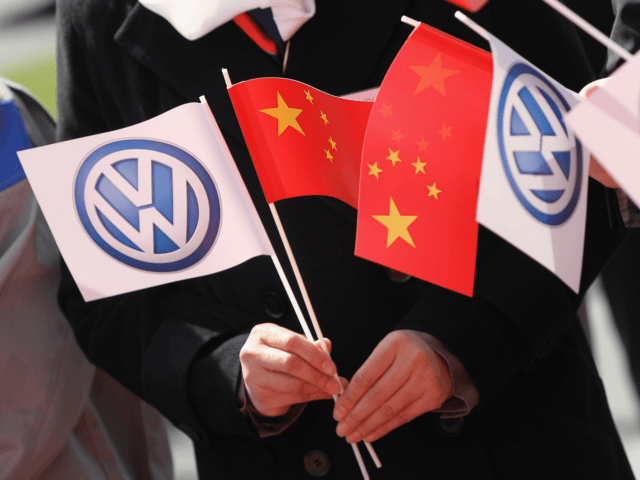German companies that side with Communist China over Lithuania are effectively destroying the European Union’s Single Market in favour of a “Sino-centric trade system,” a leading MP has told Breitbart News.
In response to the ongoing diplomatic row over Lithuania’s decision to open a de-facto Taiwanese embassy in Vilnius, the Chinese Communist Party has not only placed a blockade on Lithuanian products but also products made throughout the European Union made with any Lithuanian components.
Firms in Germany, whose largest trading partner is China, have attempted to ramp up pressure on the Baltic state to back down in its fight with Beijing in order to regain their lost profits from the Chinese market.
German car companies have been particularly impacted by the Lithuanian sanctions, with the German car-parts manufacturer Continental telling Lithuanian Prime Minister Ingrida Šimonytė last month that the financial hit of China’s blockade has already resulted in hundreds of millions of euros lost.
In a letter last month, the German-Baltic Chamber of Commerce demanded that Lithuania come to a “constructive solution” with the communist nation, saying per Reuters: “The basic business model of the companies is in question and some … will have no other choice than to shut down production in Lithuania”.
Responding to the pressure campaign from German industry, Lithuanian MP Dovilė Šakalienė told Breitbart London that if companies choose to establish their production lines based on “Beijing’s political will” rather than on the principles of the free market, then “we are living in a Sino-centric trade system”.
“Therefore, let’s not be naive – multinationals lobbying for China’s interests within their Governments are effectively undermining abilities of collective defence and possibilities for deterrence of Beijing coercion in the future,” she said.
On social media, Šakalienė noted the sordid Nazi-era history of some of the German companies who have sided with Beijing, including industrial manufacturing giant Siemens, whose CEO has said last month that the EU should not pressure China over forced labour because it may slow down the global green agenda.
Other Nazi-era firms that have been accused of profiting off the backs of forced labour in China, include Volkswagen, Hugo Boss, and BMW.
While the use of slave labour in the Xinjiang region of China has become highly publicised the communist regime has been accused of shipping Uyghurs and other ethnic minorities as effective slaves to factories throughout the Middle Kingdom.
Once in the factories, Uyghurs are reportedly forced to attend “Mandarin Chinese language classes and political indoctrination classes” and are constantly monitored by guards, who produce daily reports on the “thoughts” of the workers.
The leading MP, who was personally sanctioned by the communist government over her efforts to recognise the genocide of the Uyghurs in the Xinjiang, went on to say that the row with Beijing “is not about Lithuania anymore”.
“The undeclared secondary sanctions aimed at the exclusion of Lithuania-related goods from global supply chains is an attack against the EU’s Single Market – as excluding one member’s products or components means that the concept of the Single Market is dismantled,” Šakalienė said.
“Moreover, the actions of Beijing are an attack against international trade rules – as disrupting global supply chains by excluding one WTO member state’s production components violates the WTO standards,” she claimed.
The Lithuanian MP said that through these efforts, Communist China is “destroying the international trading system that enabled” it to become a world economic power.
On top of German companies siding with the Chinese over their EU and NATO ally of Lithuania, the recently installed “traffic light” coalition government led by Social Democrat Olaf Scholz has attempted to seek warm relations with the authoritarian government of Xi Jinping.
Under Scholz’s predecessor, former Chancellor Anglea Merkel, Germany spearheaded a mass EU-China investment pact that would have seen an increase of €120 billion in trade between the bloc and Beijing. Crucially, the deal made no mention of China needing to adhere to human rights or abandon the use of forced labour.
While the trade deal was ultimately shelved in May of last year following a series of tit-for-tat sanctions, Mr Sholz reportedly used his first call with the Chinese dictator to pledge his support for putting the deal back on the table “as soon as possible”.
This week, Chinese Foreign Minister Wang Yi held talks with German Foreign Minister Annalena Baerbock held talks to mark the 50th anniversary of relations between the CCP and the German government. The two sides, according to Chinese state media, agreed to hold “proper celebrations” to mark the event as well as to prepare for bilateral talks on trade and foreign affairs.
“China and Germany are both countries with global influence and an important driving force for China-EU relations; we should not only consider bilateral cooperation but also focus on promoting China-EU cooperation, in addition to regional and global development,” Wang said.
Even without the new investment deal and despite the impacts of the Wuhan virus, the bilateral trade between China and Germany climbed to a record high, according to Chinese state media. Although Germany has yet to publish trade figures for last year, China became the country’s top trading partner in 2018 and has remained so until at least 2020.
It is unclear whether the new German government will be able to force through the EU-China trade deal, however, with France taking an increasingly hard line on China. This week the French National Assembly declared a genocide is being committed by the communist government against the Uyghurs in Xinjiang.
France has also signalled support for Lithuania in its struggle against the CCP, calling for the EU to financially support Vilnius to mitigate the economic ramifications incurred for supporting democratic Taiwan.
Yet some in Brussels, including EU President Charles Michel, have hinted at supporting the trade pact should it be but back on the table.
Follow Kurt Zindulka on Twitter here @KurtZindulka

COMMENTS
Please let us know if you're having issues with commenting.